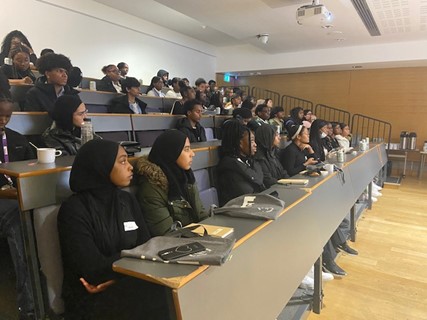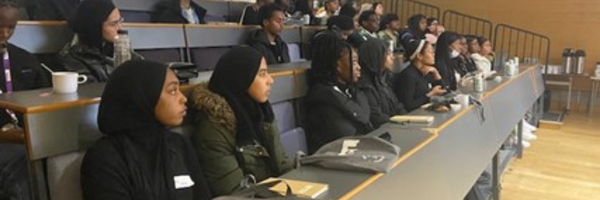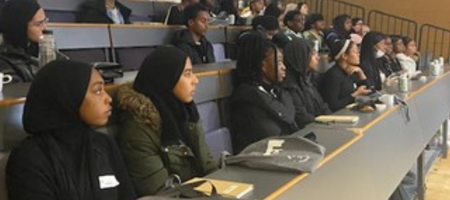The following essay was written by a Year 11 school student as part of University College London’s Aspiring Black Physiologists competition, supported by The Physiological Society. This is one of two winning essays, read the other essay here.

Would you be where you are today without the help and guidance of those around you? Those that push you to your limits, broaden your horizons and make you think anything is achievable. So much of the trajectory of our lives is centred in education. To me, education is more than just a means to a degree, or the lengthy, gruelling process to get a monotonous job. Education is the core foundation in which I was able to believe in myself, to learn that my hopes and aspirations were possible, because people like me were there to guide me.
At a superficial level, a teacher’s job is to educate their pupils, to lead them to get the qualifications to continue onto the next stage of the educational system. But to many people, they are so much more than that. Teachers are the sole key in our lives that allow us to unlock our potential. Without them, I would have never dared to dream and hope as much as I do today, because why would a working class black girl from Hackney ever get far in life? Our society is structured to see Black and Brown people fail and struggle in desperate, vital attempts to have the same opportunities as their white counterparts. The world has taught people of colour to be pessimistic about their position in life, to be complacent and willing to let others trample over us. But for us, education is our only fair ground, the only chance we have to get the equal opportunities we deserve in life. This is why diversity in teaching is so important.
Nobody wants to be in a space where they’re not welcomed. Take Ruby Bridges, for example, the first African-American to go to an all white school during the peak of racial tension in 1960. When black people are in an environment where nobody looks like them, acts like them or talks like them, they feel alienated. “How can I succeed in a place that’s not meant for me”, you’d think. “Do I even deserve to be here?” you’d say. You’d want someone in your corner, someone who fights your battles and uplifts you.
A teacher.
Unfortunately, Ruby didn’t have that person. She had to be the first to lead the change that I experience now at my school. I have a black headteacher, assistant headteacher and various people of colour at different teaching levels. Knowing that I have people that I can immediately go to without having concerns based on how they would perceive me, is very affirming. From a young age, black people have been taught that we have to change our behaviour to suit others, so that their racial bias wouldn’t affect the way we were treated. We’ve had to carry this mentality into our daily life, from the way we behave in schools to the way we behave at work. Having a teacher that comes from the same racial background as you, helps you feel welcomed, and creates a sense of belonging. You feel as though your culture is valued and appreciated. You know that you can trust that teacher, and that they can guide you.
Everybody always remembers their teachers, which is just a testament to how important they are. In 2018, 85.9% of all teachers in state-funded schools in England were White British. These teachers can be prone to ‘Teacher Labelling’ – labelling a student based on conscious racial biases. Teacher labelling leads to the self-fulfilling prophecy, where black students internalise their racist labels and act as that since their teachers don’t believe in them. If our teachers don’t believe in us, why should we believe in the chances we have of exceeding in the education system? The people who are meant to guide us, mentor us and shape us are doing the complete opposite because of the ideas society has indoctrinated them into accepting as truths, failing to see the mind behind the body. Black students have gruesome stories of how teacher labelling negatively affected their lives. I’ve heard about a black majority school where the teaching staff would make a list of all the students most likely to go to prison. I’ve also seen on the news the horrible child Q incident, where conscious racial bias from a teacher led to an innocent child being stripped searched at 15, without a teacher present, wrongly suspected of carrying cannabis on her. These are just some of the stories that stem from a lack of diversity in teaching. It’s clear that we desperately need diversity in teaching, to prevent this from happening again, so why don’t we?
It all stems from the same reason. It’s hard to be the ‘first black’ anything. It’s a lot of pressure; you’re openly in a space where you’re not welcomed. But without doing so, everything remains the same. If we’re not in management, directorial or senior official roles, we can’t place the schemes and campaigns necessary to make our teaching staff more diverse. To succeed in a system designed for your failure means to go against all odds and to fight to your utmost will constantly. We have to pave the way, because history has proven time and time again no one else will do it for us. By doing so, teachers can inspire other disadvantaged kids to do the same, to be brave and use their talents to change the world, rather than let it be.
If there are no igniters to fuel the fire of your desires and dreams, it’s even harder to achieve. Having teachers that have been through what you’ve been through is a testament to what we, black and brown students, can achieve. Black teachers can inspire black students into various fields like medicine, science, engineering, etc. so that they can be the ‘first’, inspire their fellow black people, to make our opportunities as equal as they should have been when Ruby Bridges first went to school.

